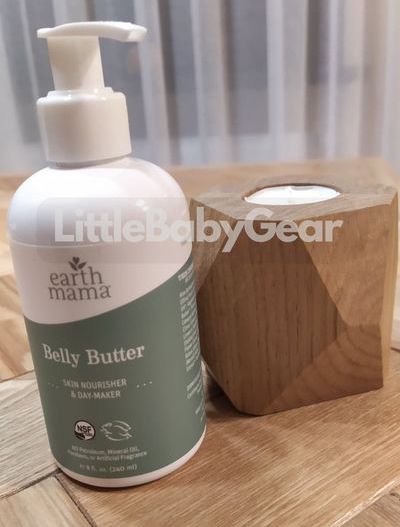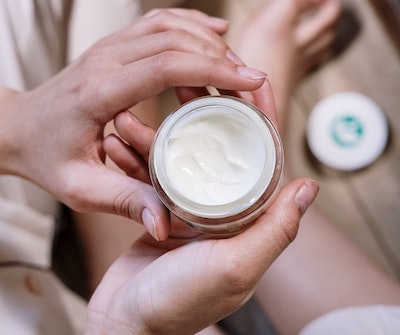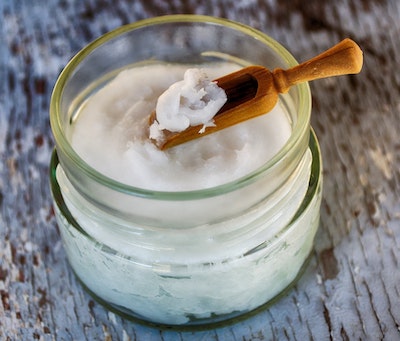When I was pregnant with our first baby I was really concerned – “why is my skin so dry and itchy?”. I did my research and found out that it’s actually one of the most common symptoms in pregnancy.
What’s interesting, the fact that skin stretches a lot on your belly is not the only reason for skin dryness. And, what’s even more important, not all beauty products, that are advertised as moisturizers for pregnant belly, are pregnancy-safe!

Pregnancy brings significant skin changes that affect up to 90% of women1. While all expecting mums hope to have that healthy pregnancy glow, it is not always the case. You may develop dry skin instead.
As a mother, I know how discomforting it can be when skin changes like dry skin, itchy skin, chapped lips, and stretch marks accompany the pregnancy phase. Fortunately, they are harmless and typically disappear after childbirth.
This article is not a substitute for medical advice.
What Causes Dry Skin During Pregnancy?
Many changes occur in the body during pregnancy as it adjusts to accommodate the growing baby. Some internal changes and external factors can cause dry skin.
Not Drinking Enough Water
Dehydration is one of the famous causes of skin dryness. When you are pregnant, your body requires more water to stay healthy, so less water leads to dehydration.
Higher Blood Volume
Blood volume increases during pregnancy, making your skin stretch. When this happens, the hydrolipidic layer, which acts as the skin’s protective barrier, thins out, causing holes to form. As a result, water evaporates quickly from the body.
Water Retention
Increased production of the hormone vasopressin causes the body to retain a lot of water during pregnancy, leading to bloating. The skin expands as a result and becomes dry.
Increase In Body Size
As your skin stretches to accommodate the baby, it loses its elasticity. Your skin could tear if it stretches too quickly, leaving dry, itchy scars called stretch marks after the tear heals.

Hormonal Changes
During pregnancy, your hormones run wild. While fluctuating hormone levels can cause the legendary pregnancy glow, it might be the opposite for you. Your skin may become dry and cracked.
What hormones cause dry skin in pregnancy? An increase in pregnancy hormones2 like estrogen and progesterone.
Deficiency Of Vitamin A
The skin can become dry and flaky if the body lacks vitamin A.
Health Conditions Like Hypothyroidism
Dry skin can result from health conditions like hypothyroidism (underactive thyroid). Hypothyroidism occurs when your thyroid doesn’t produce sufficient levels of certain vital hormones.
Excessive Washing Of The Skin
As said earlier, your skin stretches during pregnancy, making it thin and delicate. So, excessive washing can cause the skin to loose moisture.
Weather & Temperature
Changes in the weather can cause dry skin. For example, the summer heat can dehydrate the body, and the sun can make skin dry and cause sunburn.
Is It Normal To Have Dry Skin During Pregnancy?
Dry skin is a normal pregnancy symptom because your hormones fluctuate during this period. Also, the skin expands as the baby grows, making it dry and itchy.
When In Pregnancy Does The Skin Get Dry?
A woman can experience dry skin as early as the first trimester, but it is more common during the last two trimesters. As the pregnancy advances, the bump grows, causing the skin to stretch further.
During the last trimester, the body specifically requires more water, and lack of hydration during this period can lead to complications and preterm labor. So, the American College of Obstetricians and Gynecologists advises pregnant women to take 8-12 cups3 of water daily.
Where Does The Dry Skin Appear?
Dry skin issues mostly appear on the growing belly. But there can be dry patches on other parts like the face, thighs, arms, breasts, and neck.
Some moms-to-be also experience skin dryness on face, along with other skin conditions like pregnancy acne.
How To Relieve Dry Itchy Skin During Pregnancy?
Although dry, itchy skin could last the entire 9 months, you can get relief. Some of the best ways to relieve these symptoms are:
Body Lotions For Dry And Sensitive skin
Lotions can help in protecting the skin by moisturizing and hydrating it. However, some cheap lotions contain harmful chemicals that are unsafe for use during pregnancy. So, opt for pregnancy-safe lotions that are full of moisturizing nutrients, but free of toxic and harsh chemicals.

Body Oils
Body oils also moisturize the skin and prevent moisture from escaping. Taking care of stretch marks is also essential in soothing dry, itchy skin, so you can use stretch mark oils that prevent and treat them.
Stay Hydrated
Drink plenty water to maintain hydrated skin and eat foods with high water content.
Use Humidifiers
Humidifiers are necessary when the air in your home is dry. If the air is dry, add more moisture to your home using humidifiers.
How To Treat Dry Skin On Face During Pregnancy?
Your face can become dry during pregnancy, causing redness. Since the face is typically more delicate than the body, you need extra care, but it doesn’t require special treatment.
Use lukewarm water to wash your face, but don’t wash it too often. When drying your face, use a soft towel to pat it gently. Also, avoid harsh soaps and cleansers that contain irritants. To treat dry skin on the face, you can use a natural face mask like oatmeal or banana mask.
How To Help Dry Skin On Nipples During Pregnancy?
The increase in estrogen and progesterone prepares the milk duct for milk production, and as the skin expands to accommodate milk secretion, stretch marks may appear. The nipple could also become dry, itchy, and irritating.
Eczema can cause flaky skin on the nipples. Also, nipple thrush, a yeast infection that affects the nipple, can make the skin dry and crack.
For dry and cracked skin on the nipples, use nipple cream or butter, which can also be helpful when breastfeeding or using a breast pump.

Olive oil, coconut oil, canola oil, cocoa butter, and shea butter can also relieve dry skin. However, if you have nipple thrush, dermatologists will recommend antifungal medications. Wear convenient bras made of breathable fabrics, especially when experiencing dryness.
How Do I Get Rid Of Dry Lips During Pregnancy?
Dehydration causes dry lips during pregnancy when you have severe morning sickness or don’t drink sufficient water.
To get rid of chapped and dry lips, use chapsticks or lip balms to moisturize your lips but go for the hypoallergenic ones. Choose lip balms and sticks containing argan oil, shea butter, coconut oil, beeswax, or jojoba oil.
Can You Prevent Skin Dryness During Pregnancy?
Staying hydrated and avoiding things that cause skin dryness is the best way to prevent dry skin during pregnancy.
- Stay Hydrated
It might be challenging to hold down water, especially if you have severe morning sickness. Eating foods with high water content, like milk and cucumber, will help you stay hydrated.
- Wash With Lukewarm Water
Bathing or washing with hot or cold water can weaken the hydrolipidic barrier, causing dehydration. So lukewarm showers are best for pregnant women.
- Avoid Rough Fabrics
Rough fabrics rubbing against the skin can tear the weak skin barrier and cause further irritation. Wear soft fabrics that are gentle on the skin, and use soft towels to pat the body dry.
- Proper Diet
Proper dieting helps prevent dry skin, so ensure you eat nutritional foods and healthy fats like fish, avocados, and seeds.
- Hydrators & Moisturizers
Hydrating helps to add moisture to the skin, while a good moisturizer provides a barrier between the skin and dry air. Rub the hydrating lotion before the moisturizer for direct contact with the skin.
- Avoid Chlorinated Water
Expecting mums should avoid chlorinated water, which can irritate and dry the skin.
- Avoid Excessive Bathing
Bathing or washing too often with soap will strip the skin of its natural oils and cause dryness. Also, avoid chemical-filled soaps, as they can be unsafe for you.

Pregnancy-Safe & Moisturizing Ingredients For Dry & Sensitive Skin
Pregnancy-safe ingredients include:
- Hyaluronic Acid: It retains moisture and helps the skin stretch.
- Peptides: They enable the production of collagen.
- Cocoa Butter: It creates a barrier on the skin.
- Vitamin C Serum: It increase collagen production and improve skin appearance.
- Mineral Based Sunscreen: It contains either zinc oxide or titanium oxide. Always use mineral sunscreen instead of chemical sunscreen.
Toxic & Dangerous Ingredients To Avoid
Some skincare products contain unsafe ingredients for the mother and baby, so it’s best to avoid products with these elements.
- Retinoids: They are associated with congenital disabilities.
- Oxybenzone: It can disrupt hormones.
- Phthalates: They negatively affect congenital reproduction.
- Formaldehyde: It’s a well-known carcinogen.
- Hydroquinone: The body can absorb large amounts of hydroquinone which might be harmful
Natural Remedies For Very Dry Skin
Using skincare products and medications to treat dry skin is okay, but natural home remedies can also soothe dry skin. Some natural remedies to try are:
- Homemade Soap
Mix coconut oil, raw honey, and liquid castile soap as a fragrance-free alternative to chemical soaps.
- Avocado Mask
Avocado prevents and soothes dry skin. Mash half of the avocado, and add 1 teaspoon of olive oil and 1 tablespoon of honey. Apply to the face and leave for 10-15 minutes before washing off.
- Milk Bath
Milk soothes and hydrates dry skin. Mix 2 cups of whole powdered milk, ½ cup of cornstarch, and 1⁄2 cup of baking soda in your bathing water. Use rice, soy, and coconut milk if you are a vegan.
- Oatmeal Bath
Oatmeal has anti-itch properties. Blend oatmeal into a fine powder and add a handful to your bath water.
- Yogurt
Yogurt helps detoxify and hydrate the skin. Massage plain yogurt into the skin and leave for two to three minutes before rinsing off.
- Oils & Butter
Coconut oil, olive oil, and shea butter are good moisturizers for dry skin. Applying them to the skin helps in keeping moisture.

When Should I Be Worried About Dry Skin?
Though dry skin is a common problem, it could sometimes indicate severe health issues. One such issue is hyperemesis gravidarum, also called severe morning sickness, which can cause diarrhea and vomiting after the first trimester.
Extreme itching on the body and palms in the third trimester could be Intrahepatic Cholestasis of Pregnancy (ICP)4. You can experience severe itching with weight loss, dark urine, light-colored stool, fatigue, or appetite loss. ICP can lead to birth complications like stillbirth and preterm birth.
Complications of Skin Dryness During Pregnancy
Pruritic Urticarial Papules and Plaques of Pregnancy (PUPPP): PUPPP is a patch of itchy red bumps that form around stretch marks on your belly. They can spread to your arms, legs, and butt. These rashes are harmless but very itchy and discomforting.
Eczema: It’s a common complication that mainly affects the legs, neck, arms, and belly. If left untreated, it can cause red bumps, rashes, and other skin problems.
Prurigo: Prurigo is a rash that causes itchy bumps that look like small bug bites. They emerge after the first trimester on the back of the elbow and knees but can also appear on the shoulder, belly, arms, and legs. However, Prurigo is uncommon5.
When To See A Doctor?
You should see a doctor if natural home remedies do not work and the dry skin continues. Also, do so if you have very itchy red rashes or a bleeding or infected cracked skin. When you suspect that you have any skin complications or health issues, see the doctor immediately for medications.
Conclusion
Skin dryness is a common pregnancy symptom caused by dehydration and fluctuating pregnancy hormones. It can be treated and managed by staying hydrated and taking proper skin care. However, it could indicate a severe health issue.
The purpose of this article is informative. It’s not a substitute for professional medical advice or medical care. Remember: safety first! Consult your doctor/pediatrician in case of any doubts. The author of this article does not accept any responsibility for any liability, loss or risk, personal or otherwise, incurred as a consequence, directly or indirectly, from any information or advice contained here.

